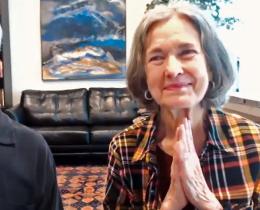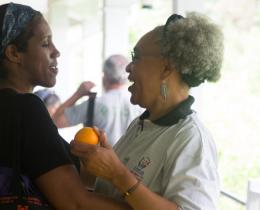Omega: How did you get the idea to customize your Mindful Self-Compassion work for couples?
Michelle: It happened at a Mindful Self-Compassion teacher training. I sat at a “special interest table” for couples during lunch. As we talked, the idea came to me to shift the Mindful Self-Compassion training a little bit from an intrapersonal approach to an interpersonal one. I got excited about the idea because I believe community really matters—if we feel connected and supported, it gives us a solid base from which we can go out into the world. So I created the Compassion for Couples program.
Omega: What is one of the skills you teach that couples really respond to?
Michelle: Becoming aware of our own patterns through mindfulness seems to be very popular. People find it extremely helpful when they answer questions like, "What activates my defense system?" "What activates my soothing system?" "What do I need from my partner to be soothed?" If you know (and can share with your partner) that your tendency is to withdraw or pursue when there’s a conflict, then you can both look out for that.
We tend to think our partner needs or wants the same things we do. For example, we think what comforts and soothes us will also comfort and soothe them, but that’s often not the case. We can learn each other’s patterns and then ask, “What does this person need?” when they’re stressed instead of doing what we would want if we were stressed. Some people will want to be held. Others will not want to be touched but will want to be listened to. It’s good for couples to know these things about each other.
We also have couples identify the shared values they want to build a relationship on. Some couples value adventure while others value things like physical health, having fun together, or raising a family with particular values. We help couples become aware of these things and then learn skills to manifest them in their relationship.
Omega: What do we do if we want our partner to be different?
Michelle: One of the first questions I always ask couples is, “How many of you came here to fix your partner?” These people are going to be disappointed!
The only person we have any influence over is ourselves. We are each responsible for our own happiness. Our job is to work on our end of the equation and become more skillful in the ways we need to become more skillful. This is why self-compassion is so important—because when we know how to comfort and soothe ourselves, it takes the desperation out of whether our partner is showing up for us in that moment or not.
Our part of the equation also includes how we treat our partner. Can we show up with a generosity of heart, a generosity of spirit? Can we lean in when they're in pain and comfort and soothe them?
As each person works on their own side of the equation, the relationship improves.
Omega: How can we tell our partner what we need without being needy?
Michelle: Working on yourself, you come to know what you need and you state it—you say where you are in a given moment. It’s a vulnerable thing to expose where we are and what we need, but we do it and let go of any expectation about the outcome. Our partner may or may not be able to meet that need for us at the moment, but we have spoken on our own behalf. And if we’re practicing self-compassion, then we never have to go without.
People are human and, whether they want to or not, will let us down. They go to sleep, they get sick, they go on vacation—and we do the same. It’s just not possible to be always available to somebody else to comfort and soothe them. So we take responsibility for meeting our own needs and hopefully our partner is also invested in being available to us when they can.
Omega: What if our partner consistently doesn’t meet our needs or doesn’t seem to be trying?
Michelle: Over time, if enough of your needs are not getting met, you might determine a relationship isn’t the right one for you. But relationships also do best when there’s an underpinning of a spirit of generosity. Can you ask, “How am I approaching this relationship?” rather than, "What am I getting from the relationship?" Of course, if you find that you're always the one giving and you're never receiving, that could be an indicator that this isn’t the right relationship.
Omega: How can compassion practices help couples who have become distant because of the demands of work, family, and everyday life?
Michelle: We often feel distant because we've stopped seeing each other. We don't feel known or appreciated. There’s nothing that increases intimacy like being seen and heard and valued. Find a way to put your attention on each other and really listen. Where attention goes, love flows, so exercises that help you see your partner and your relationship will often have an impact on increasing intimacy.
Conversations can often spiral out into the same old arguments, so we use a highly structured way of discovering more about our partner. One of the things we work with is having kind wishes for each other, much like a lovingkindness practice. When we intentionally cultivate kind wishes, it can blow the heart wide open.
Omega: What’s a common problem you see in couples that has been helped by compassion practices?
Michelle: One of the most common things I see is a tendency to personalize our partner’s behavior. Maybe we wanted something we didn’t get from our partner or we got something we didn’t want instead. We often think it’s because our partner doesn’t love us or we’re not important to them.
Let’s say we’re sad about something and we wanted our sadness to be acknowledged. If they never learned to be with their own sadness or never had a safe place to explore it, when I talk about my sadness it activates their defense system.
Instead of seeing this about the other person, we tend to take it personally. We think it’s about us, but maybe it’s not. Maybe they couldn’t do that thing because in some way they’re stuck or suffering. If you remember that the person is also suffering in that moment, it changes everything.
Omega: Is this why it’s so important to learn about ourselves and to be able to articulate our own patterns?
Michelle: Absolutely. Here’s another example: disagreements. When disagreements are happening, it’s like neither party can hear the other party. There’s a lot of talking and no listening. Both people feel they need to be heard first and then maybe they’ll listen.
At these times it’s good to take a self-compassion break. Each person comforts and soothes themselves until their defense system settles down and they come back online. Then they get together and listen to the other person. These kind of skills are teachable and learnable—they’re simple and they’re profound.



